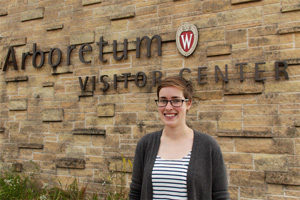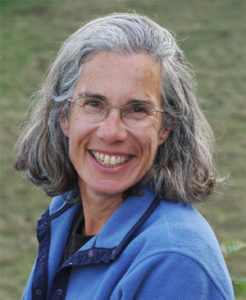2022 Conference
This is an accordion element with a series of buttons that open and close related content panels.
Keynote
“The Only Constant is Change”
The rapidly changing world around us presents challenges to living organisms, industrial systems, and global networks at all temporal scales. In this talk I will discuss how the theory of change and system resilience unites activities across the Wisconsin Institute for Discovery. I will also explore the process that the institute used to reach a unified perspective on change.
Jo Handelsman is the director of the Wisconsin Institute for Discovery and a Vilas Research Professor and Howard Hughes Medical Institute Professor in the Department of Plant Pathology at the University of Wisconsin–Madison. She previously served as a science advisor to President Barack Obama.
Her research focuses on the role of small molecules on the structure and function of microbial communities. In the course of this work, she has discovered several new antibiotics from soil bacteria by traditional culture-based methods and metagenomics. She is founder of Tiny Earth, a consortium of college instructors and students across the world dedicated to discovering new antibiotics from soil bacteria. She has just released her book, A World Without Soil.
2021 Conference
This is an accordion element with a series of buttons that open and close related content panels.
Keynote
Emerging technologies like AI, CRISPR, or neurological chimeras increasingly raise questions about the ethical and moral boundaries of science. As a result, universities are faced with the need to not just communicate about the scientific aspects of the work we do, but also about the societal, political, and regulatory implications of emerging science.
Dietram A. Scheufele is the Taylor-Bascom Chair in Science Communication and Vilas Distinguished Achievement Professor here at Wisconsin, and a Distinguished Research Fellow at the University of Pennsylvania’s Annenberg Public Policy Center.
Sessions
Tuesday, June 15, 2021
Noon–1 pm
Resource Flashtalks
- Research Data Services
- New Policy Library (Charles Meyer)
- Biosafety (Andrea Ladd)
- Purchasing for Labs/the Procure-to-Pay Automation Project (Lori Voss)
- Lab Management Community of Practice – Shared Experiences (Christy Davidson)
- Research compliance resources
Wednesday, June 16, 2021
1–2 pm
From Pandemics to Infodemics: How to Meaningfully Communicate About Science
Dietram Scheufele
Thursday, June 17, 2021
10:30–11:30 am
Transition to Single Payroll at UW–Madison
Karen Massetti-Moran, Bonniejean Zitske, and Ben Biltz
Tuesday, June 22, 2021
Being an Effective Mentor and Mentee
Anne Lynn Gillian-Daniel
Wednesday, June 23, 2021
2–3 pm
There’s Never Enough Time! Strategies to Manage Yourself in the Time You Have
Theresa Kim
Too much to do and not enough time? The answer isn’t trying to manipulate the time you have, but managing yourself in the time you’re given. Come spend an hour of your time learning some strategies that will help you do just that.
Thursday, June 24, 2021
1–2 pm
Communicating your Research through Group Websites and Social Media
Nolan Lendved, Sarah Perdue, Matt Goins, Adam Hills-Meyer
2019 Conference
This is an accordion element with a series of buttons that open and close related content panels.
Keynote
Citizen Science Gives Science Public Meaning
Contemporary citizen science is a relatively new, but rapidly growing field, with thousands of projects and millions of participants worldwide. These projects span diverse scientific disciplines, from ecology to astronomy to medicine, and more. A key feature of citizen science is its ability to quickly collect and contribute large quantities of data. However, this is only a small component of the field’s impact. Citizen science’s unique openness to participation offers extensive opportunities for science outreach and an increased public understanding of, and engagement in, the question-driven and observation-based nature of scientific research.

Jessica Ross is the Citizen Science Coordinator at the UW Arboretum. Her academic background is in biological sciences (BS, Northwestern University), and botany, ecology, and conservation (MS, Northwestern University). Her work experience includes ecological research and data processing, laboratory management, ecological restoration, and science outreach and mentoring. She currently works to develop and support citizen science monitoring programs for dragonflies, monarch butterflies, fungi, birds, and water quality.

Susan Carpenter is a Senior Outreach Specialist at the Wisconsin Native Plant Garden at UW Arboretum. Her academic background is in biology (BS, Stanford University), botany/plant ecology (MS, UW–Madison) and C&I/science education (MS, UW–Madison). Her work experience includes environmental and outdoor education, science curriculum design, teacher professional development, studying teaching and learning in elementary classrooms, native plant gardening, bumble bee monitoring and conservation in southern Wisconsin, ecological restoration, and extensive outreach for public and professional audiences.